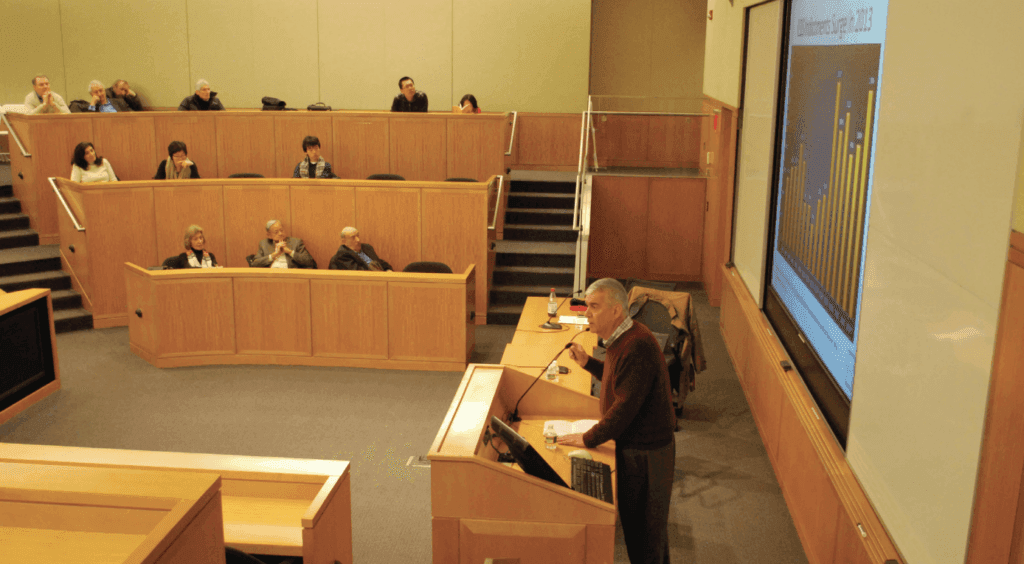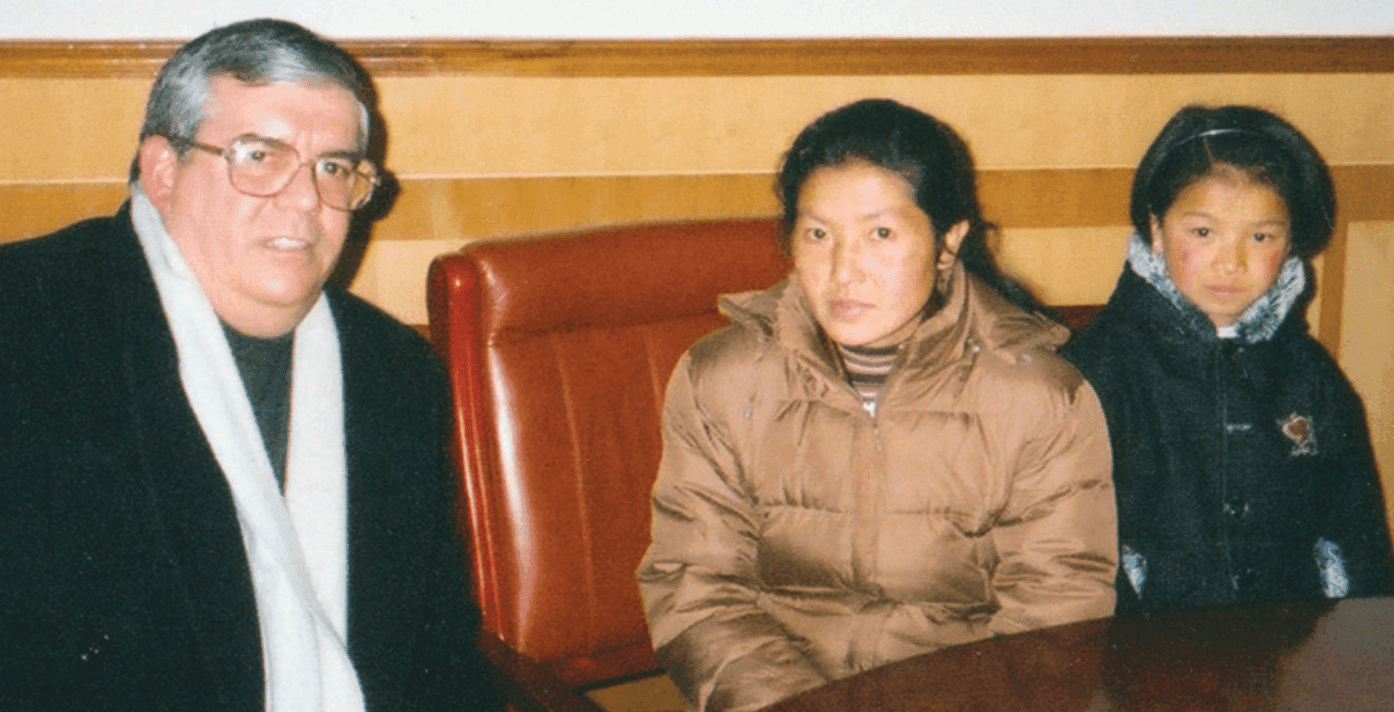EVENTS

Dui Hua greeted the Year of the Ram with two San Francisco events. On February 10, Executive Director John Kamm spoke at the Commonwealth Club for the fourth time in 20 years. His lecture, titled “Half the Sky: China’s Women Prisoners,” highlighted Dui Hua’s work on women in prison. Kamm shared findings from Dui Hua’s international symposium on the UN Rules for the Treatment of Women Prisoners and Non-custodial Measures for Women Offenders (the Bangkok Rules). A representative of the Chinese consulate attended the public Commonwealth Club event.
On February 24, more than 40 Dui Hua supporters gathered for a Chinese New Year’s reception and dinner at the Oriental Pearl Restaurant in Chinatown. Attendees included Dui Hua directors Bill Simon and Michael McCune, valued program partners, and current and former staff. In his remarks, Kamm recounted his first intervention on behalf of a prisoner, which occurred 25 years ago this May.
A highlight of each year for Dui Hua is the week spent in Cambridge, Massachusetts, home to two of America’s leading centers for China studies. From March 3-10, Executive Director John Kamm and Publications & Programs Officer Jonathan Kinkel conducted research, gave presentations, and discussed recent developments in China’s human rights with top Sinologists at Harvard and Boston University.
Kamm made remarks at three different venues. The first presentation, titled “Iron Fist, Velvet Glove,” was given at Harvard University’s Fairbank Center for Chinese Studies on March 4. It examined Chinese Communist Party General Secretary Xi Jinping’s wars on corruption and extravagance, protest and dissent, and Western values and interests. Kamm’s remarks were followed by a lively question and answer session.
The next day Kamm addressed more than 100 students at Harvard Law School regarding “Encounters with China’s Criminal Justice System.” He used cases to illustrate aspects of China’s Criminal Procedure Law, including residential surveillance, deprivation of political rights, application of the death penalty, medical parole, and treatment of counterrevolutionaries.
Also on March 5, Joseph Fewsmith, professor of International Relations and Political Science at Boston University, moderated at conversation with Kamm at Boston University’s stately Castle. Titled “John Kamm: 25 Years of Activism,” the conversation attracted an audience of 45 students, faculty, and community members. Women faculty members and students expressed surprise that they had never heard of the Bangkok Rules and asked questions about the UN standards.
In addition to the conversation moderated by Professor Fewsmith, the Dui Hua team discussed the foundation’s work with distinguished Harvard scholars: William Alford, the Henry L. Stimson Professor of Law and director of East Asian Legal Studies at Harvard Law School; William Kirby, the T. M. Chang Professor of China Studies and director of the Fairbank Center for Chinese Studies; Roderick MacFarquhar, the Leroy B. Williams Research Professor of History and Political Science and former director of the John King Fairbank Center for East Asian Research; and Ezra Vogel, the Henry Ford II Professor of the Social Sciences Emeritus.
In March, library research conducted by Kamm and Kinkel uncovered the name Omer Hebibullah, a Uyghur man suspected by police of inciting splittism. Omer was detained by Xi’an railway police on a Kunming-bound train on August 8, 2007. He was then returned to Xinjiang, where he was wanted by the public security bureau’s Special Investigation Unit.
Dui Hua research has documented other cases of Uyghurs being detained on suspicion of endangering state security (ESS) outside Xinjiang. In 2012, two men were detained in Pingdingshan, Henan Province. Adili Tursun was allegedly one of 61 “three forces” (i.e., separatism, religious extremism, and terrorism) fugitives, while Iliyar Kublati was charged with inciting splittism. Eli Exmet and Paziniye were indicted in Henan Province and tried in Jilin Province for inciting splittism. The fates of all of these individuals remain unknown.
The account of Omer Hebibullah does not state whether Omer went to trial, but if he did, it is likely that he received a lengthy sentence. Political crimes committed by Uyghurs invariably draw long sentences, and Omer’s offence was probably compounded by his failed escape attempt. Recently, Ilham Tohti’s case showed the severity with which Uyghurs are treated in China’s criminal justice system. The scholar was convicted of splittism and received a life sentence largely for his work maintaining Uyghur news site uighurbiz.net.
Even after entering prison, Uyghur political activists sometimes have their sentences extended. Dui Hua has learned that Abdukerim Abduweli, chairman of the Islamic Reform Party, has received several sentence extensions for violating prison rules. The Urumqi Intermediate People’s Court sentenced him to 12 years in prison on May 6, 1993, for counterrevolutionary propaganda and incitement and leading a counterrevolutionary group. He is now due for release on December 25, 2018, more than 25 years after he was sentenced.
At least one other Uyghur prisoner sentenced for now defunct counterrevolutionary crimes (counterrevolution was removed from China’s Criminal Law in 1997) remains in prison today. Detained in December 1996 for organizing the Islamic Party of Allah, Omer Akchi was sentenced to 14 years’ imprisonment in Xinjiang’s Aksu Prefecture. In 2006, five years before his sentence was scheduled to end, he was sentenced to life in prison for splittism. He is not known to have received any sentence reductions.
Splittism falls under the category of endangering state security crimes. This category entered the Criminal Law during the same year that counterrevolutionary crimes were ushered out. Both splittism and inciting splittism are charges often used to restrict the liberty of Uyghur rights activists.
Uyghurs are the primary target of China’s repressive religious controls in Xinjiang, but evidence suggests that Muslims who belong to the Hui minority face similar pressures. A verdict Dui Hua recently discovered online states that in 2013 the Ili Prefecture Intermediate People’s Court upheld a two-year sentence against a Hui man surnamed Ma for “gathering a crowd to disturb social order.” Ma was initially charged with “organizing a cult to undermine implementation of the law,” and according to the verdict, had conducted unauthorized Islamic classes in connection with Tablighi Jamaat in Gansu, Ningxia, Qinghai, and Sichuan as well as Xinjiang.
 Basic Knowledge of Islam was banned by the Xinjiang Press and Publications Bureau, but is still available for purchase on popular Chinese shopping website Taobao. |
Ma was accused of teaching banned religious books in mosques and homes. The books, banned by the Xinjiang Press and Publications Bureau, include Basic Knowledge about Islam, Riyad us-Saliheen, Six Virtues, and Story of Thalaba. (Some of these titles are being sold on popular Chinese shopping website Taobao.) The court found that Ma’s teachings deceived an increasing number of “ordinary” religious people, led to “religious internal contradictions,” and “seriously disrupted normal religious activity and religious administrative order.”
Ma’s verdict provides the first official evidence Dui Hua has found of a Chinese court convicting an individual affiliated with Tablighi Jamaat. It describes the group as an “overseas religious infiltration organization banned by China’s traditional Islam.” Citing findings from an Indian think tank, a Chinese study claims that Tablighi Jamaat actively propagates religious extremism in Central Asia, Russia, and Xinjiang and has indirect ties to terrorism. Iran, Russia, and some Central Asian nations have banned the organization. According to The Jamestown Foundation, “many followers of terrorist and extremist groups have reportedly attended meetings run by Tablighi Jamaat, but widespread jihadist preaching and ties to terrorist activities have not been identified yet.”
Information posted about Ma’s case in Chinese online forums make no mention of his affiliation to Tablighi Jamaat, and instead claim that a total of seven Hui Muslims were sentenced to 3-4 years in prison for “cult” activities.
Dui Hua continued to attract attention from a wide variety of media outlets in February and was mentioned in nearly 80 news articles and NGO reports in the first two months of 2015. Media sources from North America, Asia, Europe, and Australia continue to cite our work, including research on ESS prosecutions in Xinjiang and across the nation. Dui Hua’s estimate of the number of executions in China during 2013 was cited in The South China Morning Post, and Dui Hua Executive Director John Kamm was quoted in The Telegraph regarding the political climate under Xi Jinping. Commenting on counter-terrorism cooperation between the United States and China, Foreign Policy cited Dui Hua’s statistics on the disproportionately high number of state security cases in Xinjiang, characterizing Dui Hua’s data as the most up-to-date available on the topic.
Featured Article: Behind the Rarity of China’s Acquittals (February 10)

For every 10,000 people tried in Chinese criminal courts in 2013, just seven were acquitted. Despite an incremental rise in 2013, the number of people found not guilty plummeted between 2000 and 2012. Chinese prosecutors have tended to attribute high acquittal rates to “judicial precision,” but a closer look at the justice process indicates that stability maintenance may play a bigger role.
Court Flaunting of Nian Bin Acquittal Raises Questions of Lessons Learned (February 19)
Last month’s Digest: February 2015
THIS MONTH IN HISTORY
Following the release on medical parole of elderly Tibetan teacher Jigme Sangpo on March 31, 2002, and his subsequent arrival in the United States on July 13, 2002, Dui Hua shifted its attention to Ngawang Sangdrol, the young leader of a group known as the Singing Nuns of Drapchi. Ngawang Sangdrol had been detained in June 1992 and was subsequently tried and sentenced to three years in prison for the crime of counterrevolutionary propaganda and incitement. She entered Drapchi Prison the same month.

In October 1992, Ngawang Sangdrol and 13 other imprisoned nuns secretly recorded 27 songs expressing love for the Dalai Lama and their desire for a Tibet free from Chinese rule. The recordings were smuggled out of Drapchi and were soon circulating in Tibet and abroad as the CD “Seeing Nothing but the Sky.” As a result of the recording, Ngawang Sangdrol and the other “singing nuns” received three-year sentence extensions. For her continued protests in prison, Ngawang Sangdrol’s sentence was extended again in 1996 and 1998.
Following intense discussions between Dui Hua Executive Director John Kamm and China’s Ministry of Foreign Affairs (MFA), Ngawang Sangdrol was released on parole on October 14, 2002. Dui Hua received credible reports that she had serious health problems, and Kamm requested permission from the MFA to fly to Lhasa to meet her and ascertain whether she wished to receive medical treatment abroad. Permission was granted, and accompanied by an MFA officer, Kamm travelled to Lhasa in late February 2003.
On February 28, 2003, Ngawang Sangdrol, joined by her niece, was taken to see Kamm in a conference room of the Foreign Affairs Bureau of the Tibet Autonomous Region. She said she was suffering from severe headaches and requested Kamm’s help in seeking medical treatment abroad. Exactly one month later, on March 28, 2003, Ngawang Sangdrol departed China and arrived in the United States, accompanied by an officer of the US Embassy. After a brief stay in Switzerland, Ngawang Sangdrol settled in the United States, where she remains today.
One year later, in February 2004, the last of the Singing Nuns of Drapchi, Phuntsog Nyidron, had the remaining years of her sentence commuted by the Lhasa Intermediate People’s Court. By then the atmosphere in Beijing regarding prisoner releases had begun to sour. It took two years for the Chinese government to approve Phuntsog Nyridon’s application for a passport. Unlike in the cases of Jigme Sangpo and Ngawang Sangdrol, Kamm’s application to visit the nun in Lhasa was not approved. Phuntsog Nyridon eventually departed Tibet and arrived in the United States in March 2006. She now lives in Switzerland, which has the highest population of Tibetans outside Asia.
The overseas Tibetan community, governments, and human rights NGOs lobbied for and welcomed Ngawang Sangdrol’s release and credited Dui Hua for arranging it. In 2006, French director Marie Louville released to critical acclaim the documentary Prisoner of Lhasa, telling the story of Ngawang Sangdrol and John Kamm.
